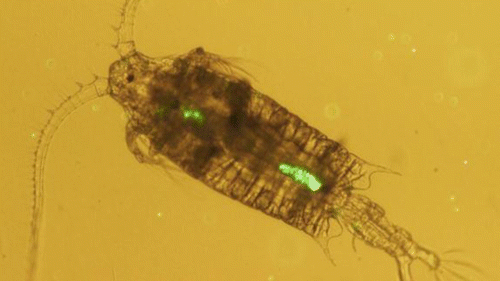July 10, 2015 report
Zooplankton filmed eating bits of plastic trash

(Phys.org)—A team of researchers and Verity White (a noted producer and director of nature films) has captured, for the first time on film, zooplankton feeding on bits of plastic—the type that has made its way into the world's oceans due to human dumping. The team has published its findings in the journal Environmental Science and Technology and has also released the videos they made of the zooplankton in action.
In recent years it has come to the public's attention that massive amounts of trash are being dumped into the world's oceans and a lot of that trash is in the form of various types of plastics—some estimate as much as eight million tons of the stuff every year goes into the ocean, helping form in some cases, huge trash islands. Plastics can take ten to twenty years to degrade and besides being unsightly, they can cause problems when marine animals eat them. Even after plastic material starts to break down it can cause problems because as it does so, it degrades into tiny particles (microplastics) which it now appears are consumed by zooplankton—a generic name given to a wide variety of mostly microscopic sized organisms that live near the surface in the sea—from crab and lobster larvae to tiny worms and pteropods.
To determine if tiny zooplankton ingest plastic particles as they go about attempting to eat their normal diet of algae, the researchers placed copepod specimens in a tank at their lab in Plymouth Marine Laboratory and filmed them as they fed. Such creatures use their legs to create a current which draws algae to them—to differentiate between plastic and other material in the water, the researchers used fluorescent beads which could be seen in both the water and in the bodies of the copepod after they ate them. The researchers noted that the plastic beads remained in the body of the animals anywhere from a few hours to a week, which suggests that in the natural environment, animals that live off zooplankton are ingesting the plastic when they feed, resulting in plastics bits making their way all the way up the food chain. In other experiments, the team reports that other types of zooplankton were also observed ingesting microplastics and that the creatures that ate the plastic tended to ingest less algae, which suggests they would provide less energy to other creatures that feed on them.
More information: Microplastic Ingestion by Zooplankton, Environ. Sci. Technol., 2013, 47 (12), pp 6646–6655. DOI: 10.1021/es400663f
Abstract
Small plastic detritus, termed "microplastics", are a widespread and ubiquitous contaminant of marine ecosystems across the globe. Ingestion of microplastics by marine biota, including mussels, worms, fish, and seabirds, has been widely reported, but despite their vital ecological role in marine food-webs, the impact of microplastics on zooplankton remains under-researched. Here, we show that microplastics are ingested by, and may impact upon, zooplankton. We used bioimaging techniques to document ingestion, egestion, and adherence of microplastics in a range of zooplankton common to the northeast Atlantic, and employed feeding rate studies to determine the impact of plastic detritus on algal ingestion rates in copepods. Using fluorescence and coherent anti-Stokes Raman scattering (CARS) microscopy we identified that thirteen zooplankton taxa had the capacity to ingest 1.7–30.6 μm polystyrene beads, with uptake varying by taxa, life-stage and bead-size. Post-ingestion, copepods egested faecal pellets laden with microplastics. We further observed microplastics adhered to the external carapace and appendages of exposed zooplankton. Exposure of the copepod Centropages typicus to natural assemblages of algae with and without microplastics showed that 7.3 μm microplastics (>4000 mL–1) significantly decreased algal feeding. Our findings imply that marine microplastic debris can negatively impact upon zooplankton function and health.
Journal information: Environmental Science and Technology
© 2015 Phys.org




















